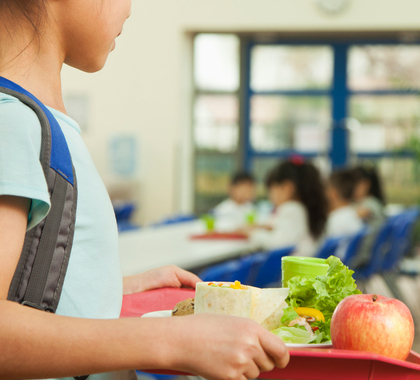House Republicans are being unfairly demonized for considering legislation that would cut back on the number of students receiving free or reduced-price school lunches.
Many conservatives, The Washington Post fiercely proclaims, “hate” the federal program, which enables “a record number of poor kids” to eat breakfast. The Trump administration could “target” the school lunch program and “take aim at immigrant children,” the Philadelphia Public School Notebook dramatically declares.
The school lunch debate is a fantastic illustration of the left doing what it does best: promoting a false narrative that paints Republicans as cruel tyrants who delight in depriving the needy of life’s basics. It’s terrible political imagery for the right, and as is so often the case, the mainstream media is getting away with spinning the facts into a fiction that fits their liberal agenda.
According to the latest School Breakfast Scorecard, an annual report released Tuesday by the Food Research and Action Center, school breakfast participation among low-income kids grew 3.7 percent in the 2015-2016 school year, The Washington Post reports. “More than 12 million low-income kids now eat breakfast at school, up almost 50 percent from 10 years ago.”
The number of low-income children relying on the government to feed them hits a record high during the Obama years, and yet somehow Trump is the enemy here? Why isn’t the left outraged that there are 50 percent more children whose parents appear unable to provide for them?
I say “appear” unable to provide for them because free and reduced-priced lunches, according to the National Center for Education Statistics (NCES), is not exactly a proxy for poverty.
“While the percentage of students receiving free or reduced price lunch can provide some information about relative poverty, it should not be confused with the actual percentage of students in poverty enrolled in school,” NCES reported in 2015. “In 2012, just over half of public school children were eligible for free/reduced price lunches. In contrast, the actual poverty rate of public school students was 22 percent. Despite the correlation between the two measures, it is important to understand that they differ in important ways and that the difference is growing.”
Whether the students who are receiving these meals really need them subsidized or not isn’t the point for liberals, because their goal is to grow government, and with it, a generation of government-reliant pawns who wouldn’t dare bite the hand that literally feeds them.
What’s more, for all their professed concern for the welfare of our nation’s children, the left seems curiously oblivious to data showing how beneficial family, not government, involvement is to a child’s health.
“Studies show that a diminished parental role in a child’s nutritional development has real consequences,” writes Julie Gunlock, a senior fellow at the Independent Women’s Forum. “And that’s exactly what happens when government takes on the role of primary food-provider for school-age children.”
Gunlock points to a 2010 Ohio State University study suggesting “preschool-aged children are likely to have a lower risk for obesity if they regularly engage in one or more of three specific household routines: eating dinner as a family, getting adequate sleep, and limiting their weekday television viewing time.”
Notice “eat every meal at school” and “rely on Michelle Obama to dictate your nutritional needs” are not listed among the suggestions for reducing obesity.
Feeding a child is the fundamental duty of a parent. If it’s true, as Gunlock writes (and evidence supports), that “the federal school lunch program has evolved into a program serving not only poor children, but children whose parents, for whatever reason, have decided not to prepare a home-packed meal for their school-bound child,” then the federal government must filter the truly needy from the rest who seem to be simply lazy.
Republicans aren’t talking about suddenly pulling the rug out from under millions of impoverished children who have grown to rely on the free lunch program. What needs to happen is a systematic reduction in the size and scope of the federal safety net. Those who don’t really need it need to be cut off immediately, and those who do currently need it need to be weaned off.
Enacting free-market solutions would go a long way in stimulating the economy and empowering parents to provide for their families.
The number of low-income kids relying on government schools for food would decrease, and so would everyone else’s tax burden. Parents would also be reminded of the pride and joy that comes from providing for one’s family, and they need to know that bonding with a child at the grocery store and the dinner table is a thousand times better for his or her development than any government-subsided meal could ever be.
[Originally Published at the Hill]





